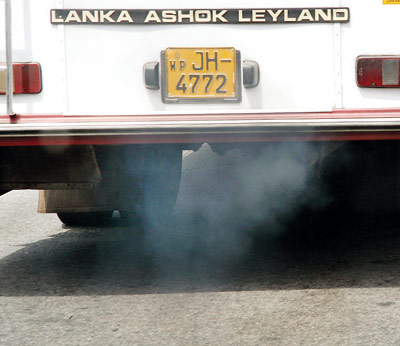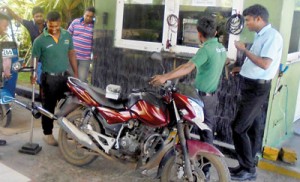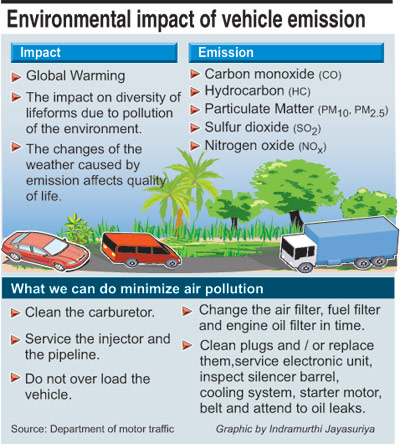News
Emmission tests under a cloud of smoke
The efficacy of emission tests on vehicles is in doubt with revelations that some results are faked and many state-run vehicles exempted from the test.

‘Smoking’ along the road: Pic by Indika Handuwala
At least 11 emission test centres have been suspended over allegations of handing out falsified test certificates and running defective computerised testing systems.
The Central Environmental Authority (CEA) said it receives many complaints from the public that the private emission-testing companies are passing vehicles that would fail valid tests.
The two privately-owned emission test companies are being investigated due to the high number of complaints, CEA acting Deputy Director-General Dr. Sanjaya Ratnayake said.
He said the CEA has begun cross-checking emission-testing stations and carrying out random checks on vehicles on the road.
“We found that some vehicles with high levels of smoke emissions held good emission test reports and alerted police to cancel their licences,” he said.
Dr. Ratnayake, who heads the CEA Pollution Control Unit, said while private sector vehicles have to obtain emission test certificates, state transport vehicles were exempt.
The Department of Motor Traffic (DMT) is also investigating emission testing centres. A senior DMT official said 44 testing centres were being checked and computer system problems had been found in all of them. Eleven centres had been shut down on suspicion of giving false information on certificates.
The DMT is also investigating both companies carrying out emission tests. The official said the DMT had begun taking photographs of vehicles emitting exhaust pollution and instructing the owners fix their vehicles and obtain new emission certificates.
A mobile smoke-testing unit was in use and would furnish evidence to take the owners to court.

An emmission test being carried out. Pic by Krishan Jeewaka Jayaruk
The official said state buses (SLTB), military vehicles, agricultural vehicles and vintage vehicles manufactured before1975 did not have to take the test. Neither did hybrid and electric cars.
Another DMT official who also spoke on condition of anonymity said the department wanted to set up a government-run emission testing station to provide better service to the public but lack of funding prevented this.
The entire fee paid by consumers for tests could go into government coffers and provide improved service whereas in the current system, run by private firms, only a percentage of the fees went to the government.
The union representing private bus drivers expressed anger that only private buses were subject to emission tests.
Lanka Private Bus Owners’ Association head Gamunu Wijeratne said old buses with smoking exhausts were given green cards to operate without emission test certificates while new private buses had to undergo tests, paying Rs. 5000 for a certificate.
“The police fine us for running exhaust-emitting buses but they are content to ride in vehicles that emit black exhaust, and Colombo Municipal Council lorries and tractors also emit fumes but we are the only ones who have to pay,” he said.
The Sri Lanka Transport Board denied its buses were old and emitted fumes. SLTB Chairman Ramal Siriwardena said government buses did not need emission testing because they did not need a revenue licence.
He also said the SLTB had a new fleet of buses and therefore, unlike private bus companies, did not have buses with exhaust problems.
School van driver Wasana Mendis said the government must import quality fuel because the main reason for high emissions as well as engine trouble was the use of low-grade fuel.
Mr. Mendis revealed that bribe-taking employees of emission-testing centres use emission readings from some vehicles to certify other vehicles, changing engine and chassis numbers and registration data to effect the fraud. They minimised emission levels during tests by driving vehicles at unusually slow speeds, he added.
Police spokesman ASP Ruwan Gunasekara said police could not intervene in the rackets in emission testing because the certificates were altered by the centre issuing certificates and that complaints lodged with police had not resulted in charges being preferred because there had been a lack of evidence.
He said action could only be taken against fraudulent documentation if a countering government document was produced.

